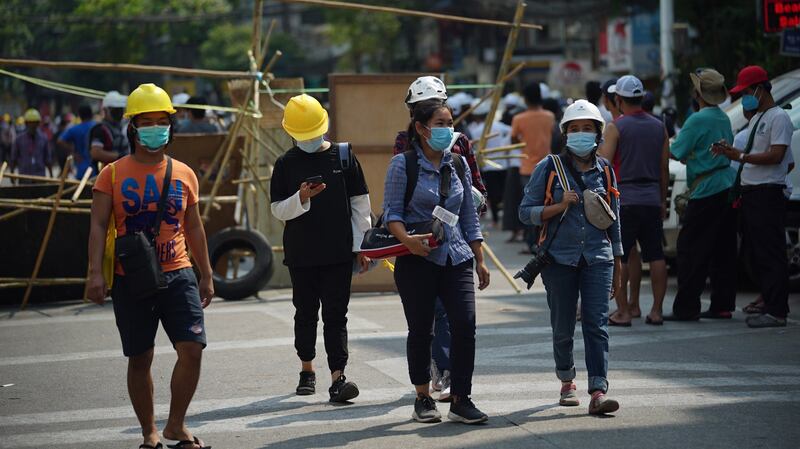Myanmar’s junta has amended the country’s law on broadcasting media in a move journalists say has ended independence of the industry’s oversight board as part of a wider crackdown on dissent.
On Friday, pro-junta media announced the passage of the Law Amending the Television and Radio Broadcasting Law, which it said was dated Nov. 16 and signed by military regime chief Senior Gen. Min Aung Hlaing.
The amendment redefines the term “council” and revokes several sections of the Broadcasting Law – all of which concern the Television and Radio Broadcasting Council, which supervises, monitors and manages broadcasts in the country.
A journalist who spoke to RFA Burmese on condition of anonymity, citing fear of reprisal, said that the amendment is part of a bid by Min Aung Hlaing to exert control over broadcasting media and manipulate information for the junta’s purposes of propaganda by removing independent oversight of the industry.
“The junta aims to prevent the council from making any complaints or putting forth controversial views,” he said. “The council will henceforth be stacked with its stooges. It’s certain that the amendment isn’t intended to promote access to information for the public.”
Section 2(q) of the Broadcast Law was amended to define “council” as a body “formed with members of the [junta] for supervising, monitoring and managing television and radio broadcasting measures. Previously, the section defined the council as “autonomous and independent from government authorities, members of the judiciary, and persons engaged in broadcasting services.”
The Television and Radio Broadcasting Council’s duties include drawing up and promulgating a code of conduct for broadcasting services, and taking administrative action on broadcasting services which violate provisions of the Broadcast Law.
The amendment also revokes Sections 9-13 of Chapters 4 and 5 of the Broadcasting Law, which concern how council members are elected, how long a council member can serve, and what justifies removal of a council member.
Opaque approval process
The amended sections had been part of the original Broadcast Law to promote transparency in the election of council members, invite debate on proposed nominees, and ensure the appointment of council members who receive a majority of votes from the public, said Than Win Htut, the director of independent media outlet Democratic Voice of Burma.
He slammed the junta for pushing through the amendment without first putting it forth for public scrutiny.
“Normally, a law or an amendment is only adopted after intense debates among the upper and lower house of parliaments, relevant departments and civil society organizations,” he said.
Than Win Htut dismissed the amendment as illegal because it was proposed and approved by an “illegitimate government,” referring to the military’s Feb. 1, 2021, coup d’etat.

In announcing the amendment, the junta said that it will be in effect “until the day the Union government has been formed” based on the results of an election it hopes will justify its grip on power, despite concerns from rights groups and democracy watchdogs that such a ballot would neither be free nor fair.
Kaung Mrat Naing, the chief editor of the Rakhine state-based Border News Agency, said the junta wants to control the narrative ahead of its planned polls.
“I think the junta is preparing propaganda for the upcoming nationwide census and election to make the [predetermined] results look official,” he said.
Kaung Mrat Naing added that members of Myanmar’s media community will “never recognize the amendment.”
Parroting junta talking points
The announcement comes barely a week after several journalists expressed concern over the junta's use of state media outlets for propaganda purposes.
The junta has revoked the licenses of four publishers and two printing houses since it seized power in 2021. Some 14 media outlets including Mizzima, Democratic Voice of Burma and The Irrawaddy have also lost their licenses.
But junta-controlled media such as Thazin FM continue to operate, broadcasting “public discussion” programs featuring callers who residents say simply parrot junta-approved talking points.
The general message repeated on such programs is that the shadow National Unity Government, or NUG, and the anti-junta People’s Defense Force paramilitaries are creating problems that worsen people’s lives.
Since the coup, the junta has arrested more than 160 journalists, 49 of whom remain in prison, according to media watchdog Detained Journalists Information Myanmar.
Translated by Aung Ning. Edited by Joshua Lipes and Malcolm Foster.
